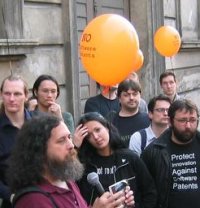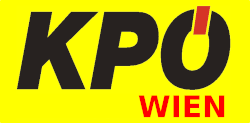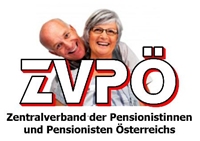Richard Stallman zu Softwarepatenten und EU-Verfassung
- Wednesday, 3. August 2005 @ 08:16
 Richard Stallman, Pionier der Freien Software und Entwickler von gcc und GPL schreibt in einem exzellenten Artikel über den Kampf gegen Software Patente, die Demokratiedefizite der EU, die Erpressung demokratischer Regierungen durch transnationale Megakonzerne und die geplante EU-Verfassung (englisch). Tuesday August 2, 2005
Richard Stallman, Pionier der Freien Software und Entwickler von gcc und GPL schreibt in einem exzellenten Artikel über den Kampf gegen Software Patente, die Demokratiedefizite der EU, die Erpressung demokratischer Regierungen durch transnationale Megakonzerne und die geplante EU-Verfassung (englisch). Tuesday August 2, 2005Last July 6, the free-software community and programmers everywhere awaited a showdown in the European parliament over software patents. The outcome was far from predictable.
If we, the free-software proponents, had lost, it would have been a final defeat in Europe. The relevant part of the European commission works hand in glove with the Business Software Alliance (BSA), and a BSA lawyer actually wrote much of the text of the draft directive the commission proposed. (We know this because they were so foolish as to publish it as a Word file, which contained information about who wrote what.)
Most of the national governments voted in favour of software patents at the council of ministers - some in disregard of the explicit instructions of their own parliaments. Some governments ceded to threats from mega-corporations. Danish newspapers reported in 2004 that Microsoft had threatened to move a recently acquired company out of Denmark if the government did not put its hand up for patents. Earlier this year, after we had thanked the Polish government for rejecting patents, it bowed to four European mega-corps that threatened to move a laboratory out of the country where they spent perhaps $15m (£8.5m) a year.
Since EU directives in these areas require agreement of both the council of ministers and the European parliament, our chances of subsequently reversing a bad directive adopted would have been negligible. Defeat on July 6 would have been a disaster for software developers and software users in the EU.
On the other hand, if the parliament had voted for amendments, the result would not have been final. The European parliament is given so little power in the EU that it can never make a decision on its own. Instead, there would have been further steps involving the parliament and the council. If the parliament had stood firm, the outcome might have been a good directive, ruling software patents out, or no directive at all. That would not have been a final victory but it would have let us aim for one.
Lobbying and protests continued in Strasbourg until the last day, but on July 5 things took a strange turn. The pro-patent forces decided to kill their own directive and began forming a coalition to push for its outright rejection. On July 6, nearly the whole parliament voted for such an outcome. The amendments were never considered, so we do not know who would have won the showdown that did not happen.
So, did consumers and programmers win anything? Yes - time, but not much.
The directive on "computer-implemented inventions" is dead but software patents in Europe are not. We have not defeated the pro-patent forces, only driven them off. They decided to avoid a showdown at that time and place, but that does not mean they have given up. We do not know when or how they will be back, but we must not assume they will use the same methods or that we have years to prepare.
This battle has implications far beyond the software field. Our years-long fight has shown how undemocratic the EU is. It is a system in which bureaucrats can make decisions that, practically speaking, the public can never reverse.
The European commission is given to serving business interests and worse; a few years ago its entire leadership was forced to resign for corruption. Bullying a whole national government appears to be easy, but there is usually no need to go that far: it suffices to convince one minister, or the minister's representative, to vote as desired. The Hungarian representative voted for software patents even as his prime minister said Hungary was against them. The German representative voted in favour even after the German parliament voted unanimously against. The Dutch government pushed software patents through the council of ministers after its parliament ordered it to reject them.
Europeans are fortunate that French and Dutch voters conclusively rejected the proposed EU constitution. The document explicitly prioritised the interests of business over the public. It slightly increased the power of the parliament while greatly increasing the power of the council of ministers: in other words, it would have made the union less democratic. The rejection provides an opportunity to consider something better. I have a proposal.
The unelected European commission and the national governments that cannot stand up to business pressure should have no role in forming EU directives. Instead, every directive should start in the European parliament. If approved there, it should go for ratification by an "upper house" representing the people of Europe by means of referendums. These might be arranged in many ways; one would be for each directive to require the approval of a majority of the electorate in countries whose combined populations add up to two-thirds of the EU. Referendums would discourage the EU from adopting directives over things that could well be left to individual countries to decide.
Europe may or may not use the opportunity of the present impasse to adopt a more democratic constitution, but software users in Europe must not fail to make use of the breathing space they have gained. This is not the time to relax and celebrate. It is the time to strengthen the anti-software-patent movement in Europe to meet the next assault.
© 2005 Richard Stallman. Verbatim copying and distribution of this entire article are permitted worldwide without royalty in any medium provided this notice is preserved.
links:



